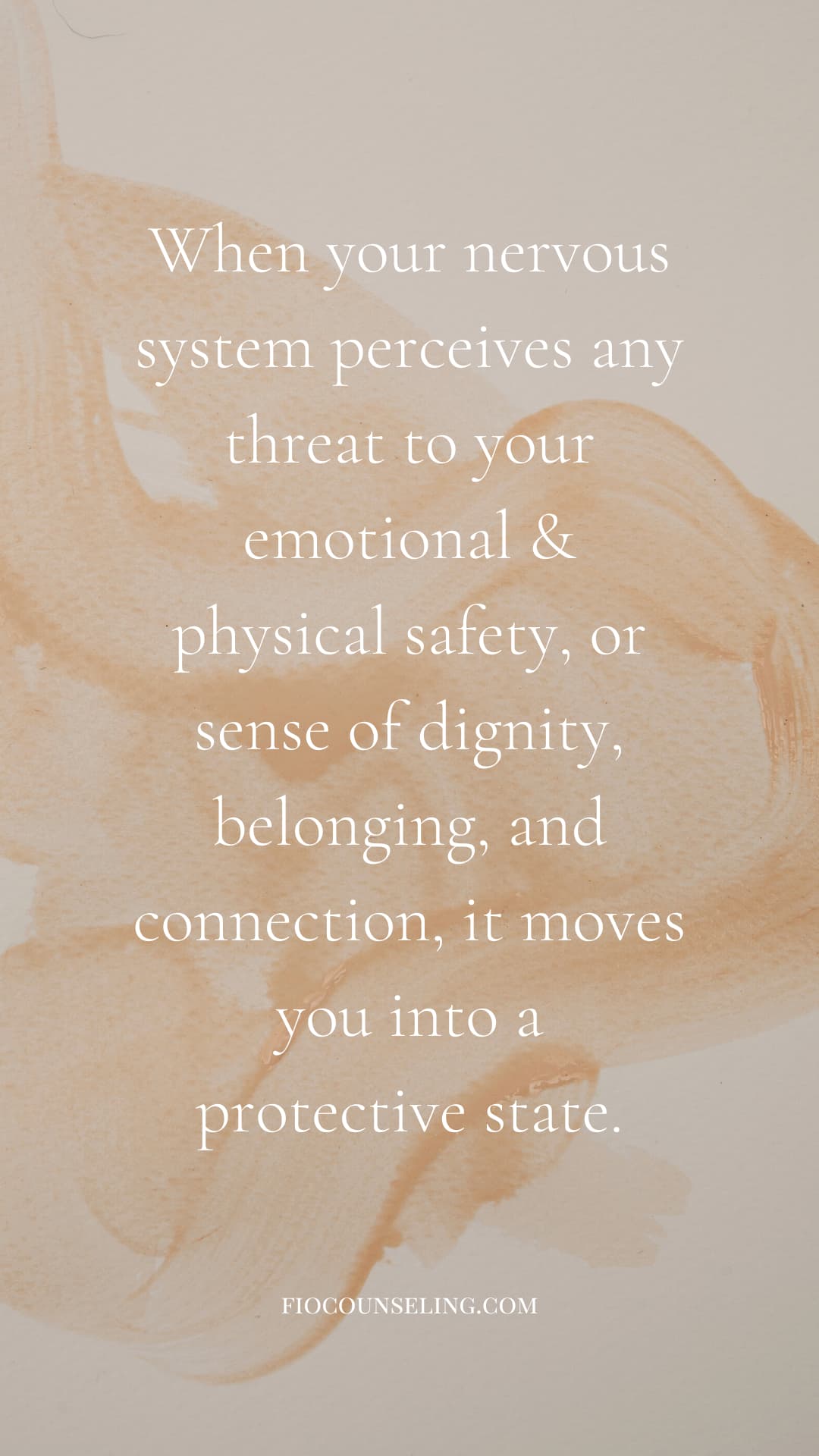Find Your Way Back To You: Nervous System Regulation Insights For Trauma Survivors
Understanding your nervous system as a trauma survivor is like having keys to your own car. Knowing how your body functions makes your otherwise confusing and overwhelming internal experience make complete sense.
What Is Your Nervous System?
As Deb Dana describes it, your autonomic nervous system is your “personal surveillance system” that listens “moment by moment to what is happening in and around our bodies and in the connections we have to others.” When your nervous system perceives any threat to your emotional and physical safety, or sense of dignity, belonging, and connection, it moves you into a protective state. A healthy nervous system can move fluidly between regulated and dysregulated states (more on this in a moment). However, traumatic experiences or chronic stress disrupts this flexibility and you’re left with a system that gets stuck in survival states. You may notice this play out in symptoms of anxiety, depression, chronic health issues, hypervigilance, headaches, sleep challenges, and GI issues just to name a few. Your brain works to locate you in time and space, but when you’re in a survival state, it tends to become disconnected from the present and stuck in the past. Meaning you become disconnected from the present: from yourself, from others, from your environment. Threats from the past become reactivated in your body as if it’s happening in the present.What is Dysregulation?
Difficulty navigating your emotions and experiences is a reflection of being outside of what Dr. Dan Siegel refers to as the window of tolerance, or the range of arousal in which one can experience their circumstances or feel their feelings in a tolerable way within their body. Being in a state of dysregulation is being outside of your window of tolerance. While outside of your window of tolerance, the areas of your brain responsible for logic, reasoning, decision-making, meaning-making, and emotion regulation go offline. Being inside your window of tolerance allows you to tolerate your emotions and experiences. This is the place from which you can access connection, authenticity, and awareness. Because your entire brain is online, you can access personal agency and choice about how to react to your circumstances.Regulating Your Nervous System
A major player in your “personal surveillance system” is the vagus nerve. This wandering nerve is a primary communication channel between brain and body, with more than 80% of communication traveling from body to brain. So it only makes sense that enhancing this system involves understanding how the vagus nerve functions and influences the 3 primary states of the nervous system.#1: Ventral Vagal
When your system is in this state, you feel safe, confident, calm, capable, connected, curious, creative, compassionate, strong, hopeful. You may feel grounded, anchored, or expansive. The story that feels truest in this state is I can do it, I have what it takes to face this. This is what we’re referring to when talking about being regulated.#2: Sympathetic Activation
This is the state we commonly refer to as fight or flight. When you’re in this state, you feel amped up, anxious, irritable, angry, out of control, scared, unsafe. Your body is generating survival energy to mobilize you to respond to whatever feels threatening, which you may notice as an accelerated heart rate, shallow or rapid breathing, restlessness, shaking or trembling, or tunnel vision. The story that feels truest in this state is I have to do something about this now, or else.
#3: Dorsal Vagal
When your system is in this state, you feel shut down, depressed, numb, shame, fatigued, hopeless, helpless, stuck, disconnected. Your heart rate and blood flow decrease, your thinking may become foggy, and you feel weighed down. The story that feels truest in this state is I can’t, I don’t have what it takes to deal with this. If your body becomes too overloaded by survival energy in fight or flight, it may move you into this state as a last resort.Honorable Mention: Freeze
Sometimes your nervous system gets caught between sympathetic activation and dorsal vagal. What you feel is a combination of activation and shutdown. Your body simultaneously wants to move and feels compelled to fight/flee but also feels weighed down and stuck.Considerations for Learning More About Your Nervous System:
- What are cues of safety for you?
- What are cues of danger for you?
- My dorsal vagal system kicks in when…
- My sympathetic system activates when…
- My ventral vagal system awakens when…
Next Steps: Begin Trauma Therapy In Denver for Anxiety
If you’re ready to befriend our nervous system and heal your trauma & anxiety, reach out to a qualified trauma therapist at Fio Counseling. Follow these 3 steps to get started:- Schedule a free 20-minute consult call at a time that’s convenient for you.
- Connect with a trauma specialist in Denver, CO at Fio Counseling.
- Begin healing your relationship with yourself!

